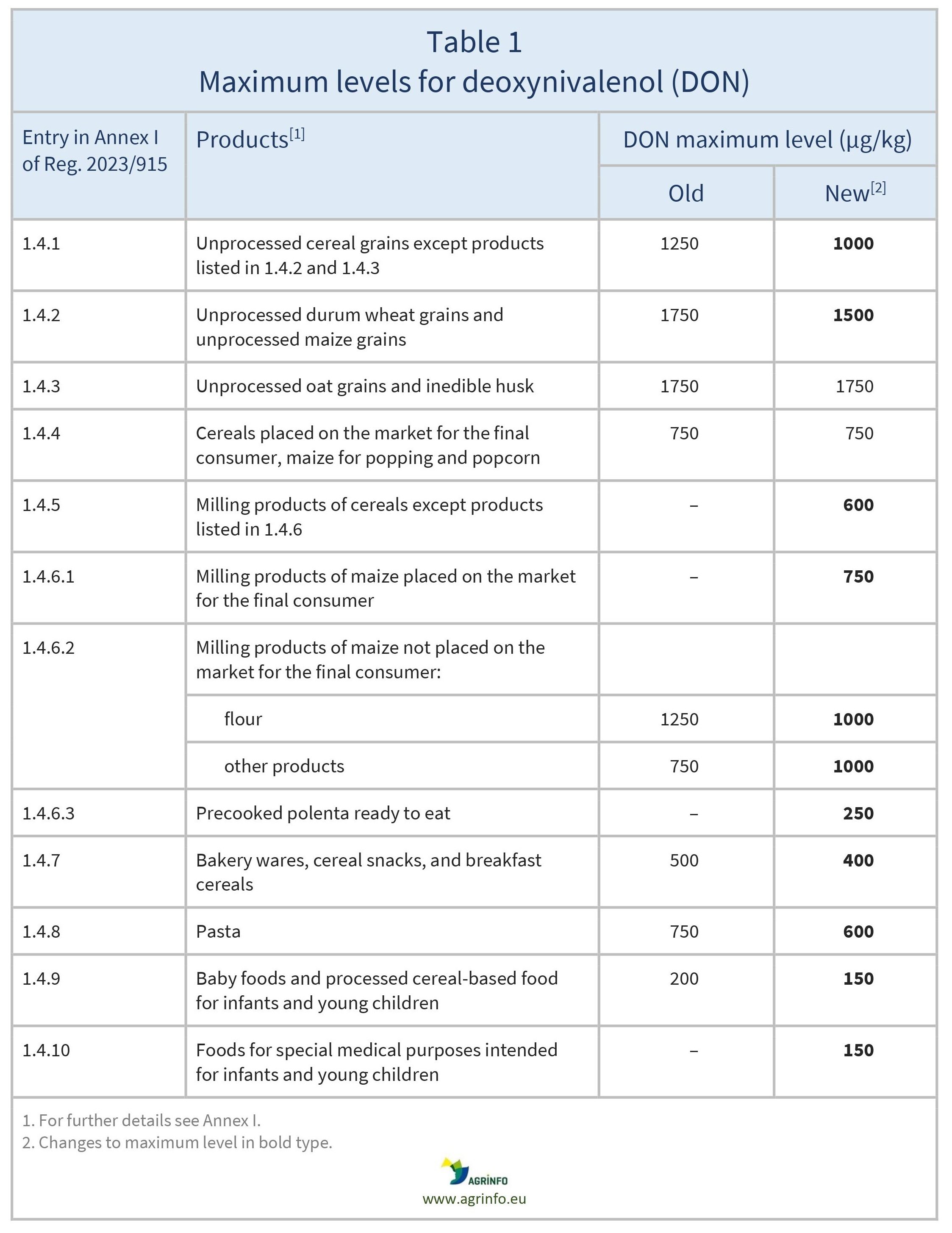Reduction of maximum levels of deoxynivalenol in cereals/cereal products
- Contaminants
- Food safety
Summary
The EU has reduced deoxynivalenol levels in various cereal products to protect public health, especially for vulnerable groups such as infants and young children. The products affected include milled maize products, precooked polenta, bakery wares, cereal snacks, breakfast cereals, pasta, and baby foods.
EU reduces maximum levels of deoxynivalenol in cereals/cereal-based foods
Commission Regulation (EU) 2024/1022 of 8 April 2024 amending Regulation (EU) 2023/915 as regards maximum levels of deoxynivalenol in food
Update
The EU has reduced deoxynivalenol levels in various cereal products to protect public health, especially for vulnerable groups such as infants and young children. The products affected include milled maize products, precooked polenta, bakery wares, cereal snacks, breakfast cereals, pasta, and baby foods.
Impacted Products
Cereal-based foods, wheat and barley products (flour, semolina, flakes), unprocessed cereal grains (wheat, maize, barley), infant foods, precooked polenta, bakery wares, cereal snacks, breakfast cereals, pasta, baby foods
What is changing?
The European Commission has lowered existing maximum levels of the mycotoxin deoxynivalenol (DON) in various cereal-based foods. The changes to existing maximum levels are highlighted in Table 1.
Why?
EFSA (2017) expressed concerns about the levels of exposure to DON among European consumers, particularly for certain groups for whom the tolerable daily intake (TDI) could potentially be exceeded, creating health risks.
Timeline
The new maximum levels apply from 1 July 2024.
What are the major implications for exporting countries?
To comply with these regulations, exporting countries may need to invest in more rigorous quality control measures and monitoring of contaminant levels in export crops. Non-compliance with these standards can lead to trade restrictions or bans, impacting the market access of exporting countries. Farmers and producers may need to adopt improved agricultural practices to reduce the risk of DON contamination.
Recommended Actions
Non-EU suppliers of cereal products should urgently evaluate current levels of DON in these products to identify any potential non-compliance and strategies for reducing the presence of this mycotoxin.
Agricultural practices to reduce the risk of DON contamination include crop rotation and selecting resistant crop varieties. EU recommendations on preventing and reducing Fusarium toxins in cereals and cereal products can be found in Commission Recommendation 2006/583/EC.
More generally, to mitigate the risks of potential non-compliance with maximum contaminant levels, non-EU countries should:
- ensure sampling and testing capacity for the contaminants listed in EU Regulations; training is available, for example through the European Commission’s Better Training for Safer Food (BTSF) Academy
- ensure that, where feasible, established strategies for reducing contamination are systematically disseminated and implemented in relevant agricultural value chains
- contribute data to EFSA’s annual data collection process to ensure that risk assessments undertaken by EFSA have a complete picture of the current prevalence of contaminants in non-EU countries.
Background
Mycotoxins are secondary metabolites produced by fungi that grow naturally in food and feedstuffs including grains, nuts, and fruits, particularly under warm and humid conditions. Deoxynivalenol is a specific type of mycotoxin produced by Fusarium species.
The European Union establishes maximum allowable limits for mycotoxins in food products to ensure that they remain within safe consumption levels. The legal framework for these maximum levels is established by Council Regulation (EEC) 315/93 (basic principles) and Commission Regulation (EU) 2023/915 (maximum levels). The EU aims to set maximum levels following the principle that they should be as low as reasonably achievable by applying good practices, and on the basis of scientific advice provided by the European Food Safety Authority (EFSA), taking into account data on the occurrence of contaminants in foodstuffs from various origins. See EU legislation on contaminants – maximum levels explained.
Resources
EFSA (2017) Risks to human and animal health related to the presence of deoxynivalenol and its acetylated and modified forms in food and feed. EFSA Journal, 15(9): 4718.
Online resources from the European Commission:
- Factsheet: Food contaminants
- Sampling and Analysis: Guidance Documents
- Guidance document on identification of mycotoxins and plant toxins in food and feed
Regulation (EU) 2023/915 on maximum levels for certain contaminants in food
Regulation (EEC) No 315/93 laying down Community procedures for contaminants in food
Sources
Commission Regulation (EU) 2024/1022 as regards maximum levels of deoxynivalenol in food
Disclaimer: Under no circumstances shall COLEAD be liable for any loss, damage, liability or expense incurred or suffered that is claimed to have resulted from the use of information available on this website or any link to external sites. The use of the website is at the user’s sole risk and responsibility. This information platform was created and maintained with the financial support of the European Union. Its contents do not, however, reflect the views of the European Union.
EU reduces maximum levels of deoxynivalenol in cereals/cereal-based foods
Commission Regulation (EU) 2024/1022 as regards maximum levels of deoxynivalenol in food
What is changing and why?
In 2017, the European Food Safety Authority expressed concerns regarding consumers’ exposure to the mycotoxin deoxynivalenol (DON). The EU has therefore reduced the maximum DON levels in various cereal-based foods, as set out in Table 1.
Actions
Non-EU suppliers of cereal products should urgently evaluate current levels of DON in these products to identify any potential non-compliance and strategies for reducing the presence of this mycotoxin.
EU recommendations on preventing and reducing Fusarium toxins in cereals and cereal products can be found in Commission Recommendation 2006/583/EC.
Timeline
Date of entry into force: 1 July 2024.
Disclaimer: Under no circumstances shall COLEAD be liable for any loss, damage, liability or expense incurred or suffered that is claimed to have resulted from the use of information available on this website or any link to external sites. The use of the website is at the user’s sole risk and responsibility. This information platform was created and maintained with the financial support of the European Union. Its contents do not, however, reflect the views of the European Union.

